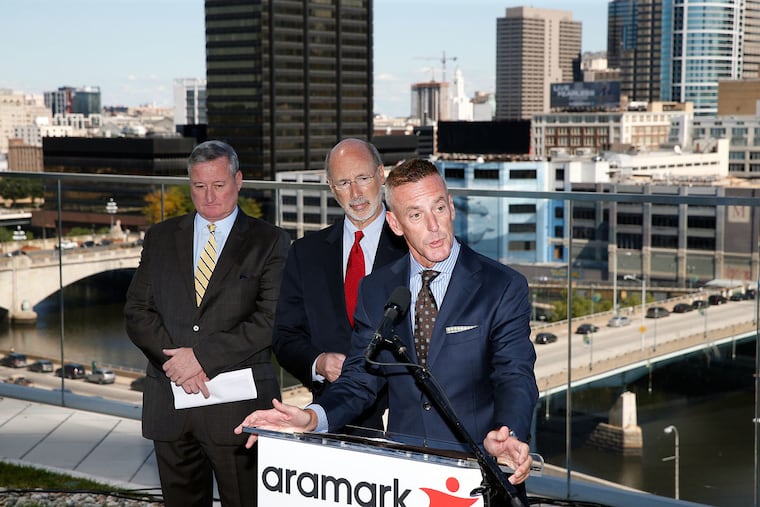Aramark CEO Eric Foss retires abruptly; severance pay includes monthly salary of $142,000
No immediate replacement was named for Foss, who joined Aramark in 2012 and led the company though a 2013 IPO, but faced criticism from some on Wall Street for increasing revenues too slowly.

Philadelphia-based food- and uniform-services giant Aramark Corp., in a surprise announcement Monday, said chief executive Eric Foss will retire.
The announcement comes 10 days after an activist investor disclosed a large equity stake in Aramark and said he wanted to discuss executive changes at the company, which has been under fire from Wall Street analysts for its inability to grow revenues as fast as rivals, and from employees for yanking their 2018 earned bonuses in a last-minute move.
Foss’ severance pay includes $3.4 million in salary paid in monthly installments over two years and two times whatever bonus he would have earned for the fiscal year that ends Sept. 27. Last year, his annual bonus was $2.6 million.
No immediate replacement was named at the company, whicht employs about 274,400 people, including 14,000 in Pennsylvania and nearly 6,500 in the Philadelphia region. Typically, when the CEO of a major publicly traded company leaves with no replacement, it’s a sign of turmoil that can result in even bigger changes to come.
For now, an Office of the Chairman made up of senior executives was named to oversee day-to-day operations until Foss’ successor is found. Stephen Sadove, currently Aramark’s lead director, was named to replace Foss as non-executive chairman.
“This is a graceful way for Eric to depart. He could have chosen another path, which is to go to war with the activist," said Dan Dolev, an analyst at Nomura Instinet who in March called for an activist investor to push out current Aramark leadership.
Mantle Ridge, led by activist investor Paul C. Hilal, announced on Aug. 16 that it had acquired 9.8% of Aramark’s shares, plus additional interests that give it a 20% economic interest in the company. Mantle Ridge declined to comment, a spokesperson said.
Asked if Mantle Ridge’s arrival had anything to do with Foss’ departure, an Aramark spokesperson said: “Eric’s retirement was a mutual decision between Eric and the board of directors. It was made without regard to any other stakeholder input.”
Foss joined Aramark as president and CEO in 2012, succeeding longtime leader Joseph Neubauer, and led the company through a 2013 initial public stock offering.
“It has been an honor and privilege leading Aramark through a transformative journey, from a successful IPO to an impressive run as a public company,” Foss said in a news release.
Foss will remain in an advisory capacity until Oct. 2. His severance pay includes a $2,000-per-month car allowance for two years, plus the continuation of certain stock-based compensation programs.
Dolev was critical of Foss’ tenure because of the executive’s focus on increasing profit margins while competitors were more successful at increasing revenue. Aramark should increase what it spends on food to boost the number of contracts it wins, add to its business in the health-care sector, and spin off its uniform business before a recession strikes, Dolev argued.
The stock was up about 4% on Monday.
Foss had faced criticism earlier this year for his decision not to pay bonuses earned in 2018 to front-line managers because the company did not meet a profit target set by the board of directors, even though Foss touted record revenues and profitability for the year ended in September.
Thousands of lower-level managers were furious at Foss because they were not told at the beginning of the fiscal year that a company-wide profit target would be a factor in their bonuses. At least three lawsuits have been filed by employees or former employees, two of them seeking class-action status, over the bonus cancellations.
Meanwhile, Foss and other executives got their bonuses, because Aramark’s adjusted operating income landed precisely on the minimum target — $974.5 million — for top executives to receive a bonus. That figure, which excludes the gains from company-wide lower incentive pay and other factors, was 95 percent of the company’s $1.03 billion target.
As a group, investors two years in a row have panned Aramark’s executive pay practices in their annual non-binding “say on pay” vote. The approval rate climbed to 55.8% at this year’s annual meeting from 50.7% last year, according to Aramark’s SEC filings. Experts consider anything less than 80% a failing grade.